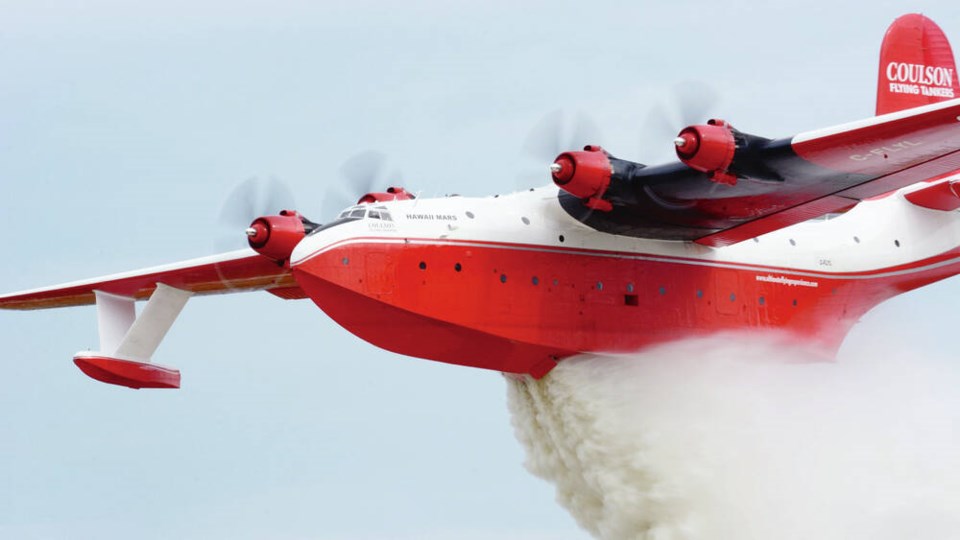The Hawaii Martin Mars water bomber is set to arrive at the B.C. Aviation Museum in August, months earlier than expected.
Museum president Steve Nichol said Thursday the Mars is expected to fly into the Patricia Bay Coast Guard base between Aug. 5 and 10, rather than at the end of the year.
Coulson Aviation of Port Alberni, which has spent months getting the water bomber operational and a crew ready for its final flight, informed the museum this week of the new plan.
Nichol said planning is being stepped up now to bring the world’s largest fixed-wing water bomber — with a wing span of 200 feet and a body 120 feet long — out of the water at Patricia Bay and over land to the B.C. Aviation Museum at the far end of the airport, about two kilometres away.
Nichol Brothers, movers of houses and other large unwieldy structures, has been contracted to move the plane, said Nichol.
The Mars will be hoisted out at Patricia Bay and placed on a motorized dolly with a swivelling cradle that will allow operators to manoeuvre it through tricky turns and terrain. “They will be able to rotate the plane 360 degrees … it will be Hawaii Martin Mars yoga just to bring it out,” said Nichol.
Nichol said the coast guard base will have to be cleared of boats, planes and vehicles as the Mars is “de-watered” for a day, and then power lines, light posts and fencing will have to be moved at the base and along West Saanich Road to bring the plane onto airport lands.
The move will take place during the early-morning hours between Aug. 5 and 10, said Nichol.
The museum has partnered with multiple agencies, including the airport authority, Nav Canada, the RCMP and municipal and provincial authorities, to make it happen.
“It’s a huge undertaking with a lot of risks,” said Nichol, a pilot for 43 years who has been involved in aircraft restoration and moves for decades. “We’ve been working on this for years, and I am confident this will work.”
The museum said it is expecting thousands of people to watch the plane arrive, and the event, which has attracted international interest, will be filmed for a “full-production documentary.”
The Hawaii Mars will be at the museum for its annual open house on Aug. 17 and 18.
A specially designed final resting place is being built for the massive air frame outside the museum’s main hangar. The province in March announced $250,000 in funding to help establish the aircraft as the centrepiece of its new B.C. wildfire aviation exhibit.
Coulson Aviation has enlisted five former certified maintenance engineers and four flight crew to complete aircraft preparation and flight retraining over the past several months to prepare the red-and-white Hawaii Martin Mars for its last flight.
The company also announced this week it’s offering VIP experience packages to get up close and personal with the Martin Mars water bombers, including a half-day ground school session followed by a journey around Sproat Lake. Another group of participants will get the opportunity to test their skills at handling the Mars on the water, at both low and high speeds.
The Philippine Mars — the only other aircraft of its kind — is being prepared for a new home at the Pima Air and Space Museum in Tucson, Arizona, after being retired in 2012. The red and white Hawaii Mars had its last fire season in B.C. in 2015.
During their heyday fighting fires in B.C., the Mars aircraft — originally large troop and cargo transports during the Second World War — were capable of dropping 25,000 litres of water on wildfires.
>>> To comment on this article, write a letter to the editor: [email protected]



